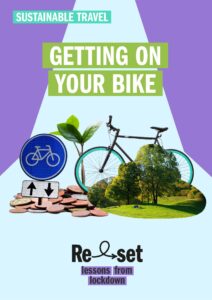As Covid-19 took hold, fears over transmission grew and governments introduced stay-at-home orders, car and public transport use fell dramatically. Pictures of formerly congested international megacities spread showing peaceful, empty highways and clearer skies, while pavements and parks grew busy as millions rediscovered the benefits of walking and cycling.
“The pandemic accelerated the development of cycling schemes around the world and revealed what many of us who have been working in this space for years have long known: that there is great and heretofore untapped demand for safer streets for riding bicycles for transportation. Smart cities understood the obligation to satisfy that demand.”
Doug Gordon of Brooklyn Spoke
Bicycle use was also encouraged and enabled through government policy, the creation of dedicated and safe cycle lanes, and a range of financial incentives that made getting
in the saddle not only the healthiest and easiest option, but the most profitable. Most importantly though, the bicycle gave people freedom during a time of restrictions, where they got to experience their towns and cities from a new, different perspective.

This story is part of the Reset series – a collection of short downloadable stories that look in more detail at over consumption and unnecessary travel. They consider some of the key messages and solutions that have become apparent during the pandemic that could help us make the rapid transition to a more sustainable future.
This guide has been made possible by the support of ClimateWorks Foundation.
 The climate-friendly bicycle – still overlooked by many city planners – enjoyed a revival throughout lockdown. Bike suppliers struggled to keep up with renewed demand and a global shortage of bicycles was declared that is expected to last well into 2022. This Reset story looks at how people found better ways to get around during the pandemic, that were good for health, cleaner air, more peaceful and safer communities.
The climate-friendly bicycle – still overlooked by many city planners – enjoyed a revival throughout lockdown. Bike suppliers struggled to keep up with renewed demand and a global shortage of bicycles was declared that is expected to last well into 2022. This Reset story looks at how people found better ways to get around during the pandemic, that were good for health, cleaner air, more peaceful and safer communities.